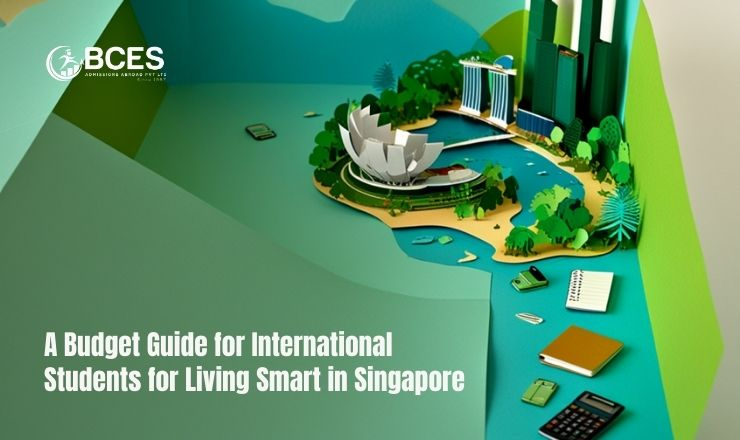A Budget Guide for International Students for Living Smart in Singapore

30 August 2025
Singapore has become one of Asia’s most famous places for studying for International students, presenting an ideal combination of world-class education, diversity of cultures, and a secure place to live. Thousands of students from around the globe arrive every year in Singapore because of its renowned universities at the global level, cosmopolitan lifestyle, and high career prospects.
While the city is always equated with its up-to-date infrastructures and lavish living standards, it is worrying for most students at first regarding the cost of living. The best news is that studying in Singapore need not be expensive. By budgeting wisely and making wise day-to-day decisions, foreign students can have the best of what the city provides without spending beyond their means.
Establishing oneself in a foreign country starts with securing the appropriate place of residence. For students, housing can occupy the largest chunk of expenditure. Although renting a personal flat in the city center is expensive, there are numerous inexpensive alternatives. Shared flats, on-campus dormitories, or government-subsidized HDB flats are the preferred options of students. HDB flats are not just affordable but also safe, well-connected with public transport, and in student-friendly estates like Jurong, Clementi, and Tampines. The locations are convenient for traveling and yet offer cheap rentals as opposed to the Singaporean heartland.
Food is also one sector where students can cut down considerably. Rather than eating at high-cost restaurants or cafes, most international students soon develop a love for Singapore’s hawker centres. These busy food courts provide many local and international food at reasonable prices catering to students. You can have a full meal for SGD 3 to SGD 5, which is much lower than dining at restaurants. Preparing a meal or two at home per week is another strategy to save money, particularly when buying from discount supermarkets such as FairPrice, Sheng Siong, or Giant. For fresh fruits, vegetables, and spices, traditional wet markets often provide better deals than supermarkets.
Singapore travel is easy and affordable because it has a world-class public transport system. The city is covered by buses and the MRT, making traveling convenient and easily accessible. There are concession fares for students as well, which reduce traveling costs even more. Payment of journeys is easy through an EZ-Link card or NETS FlashPay card. Singapore is also highly walkable and bikeable, so walking or cycling can save you money and keep you healthy.
When it comes to entertainment and leisure, students do not have to break the bank to enjoy themselves. The city has much to do that is free or low-priced. You might spend an afternoon at Gardens by the Bay, visit cultural enclaves such as Chinatown or Little India, or take in the stunning Marina Bay skyline. Museums, cinemas, and attractions usually offer student discounts on admission, so having your student ID card can pay for itself during your visit.
Healthcare is a key aspect of studying abroad, and Singapore provides it in an affordable and accessible manner. The majority of universities incorporate health insurance into tuition, so students are covered for basic treatments. For minor complaints, government polyclinics are affordable and effective, generally much more economical than private clinics. This eliminates the need for students to be concerned about surprise medical expenses.
Being a student in Singapore as an international student is not only learning to earn a degree but also learning how to be independent, balancing a budget, and living in one of the world’s most vibrant Asian cities. With some diligent planning financially, opting for low-cost accommodation, eating reasonably, using public transport, and taking advantage of student discounts—you can live a good life while studying.
At BCES Admissions Abroad, we facilitate students at each stage of their overseas journey. From the choice of the right university to advice on the practicalities of student life, we make your overseas move hassle-free and fulfilling. If you are looking to pursue studies in Singapore and seek expert advice, speak to us now at +91 9319996330 and embark on your journey with confidence.
Frequently Asked Questions (FAQs)
Not necessarily. While Singapore is highly touted for high quality of living, students who share housing, eat at hawker centres, and use public transport can live on the cheap.
Globally, students budget SGD 800 to SGD 2,000 a month, depending on lifestyle, housing, and personal preferences.
Yes, foreign students in accredited institutions are able to work 16 hours per week during study semesters and full-time holidays during semesters.
The cheapest and most popular option is eating at hawker centres, where meals start from around SGD 3. Cooking at home also reduces expenses.
Public transport is convenient and affordable. Students enjoy discounted concession passes for buses and MRT, making travel within their reach.
Yes, most colleges provide medical insurance as part of the tuition package. For general visits, government polyclinics are within reach and affordable.